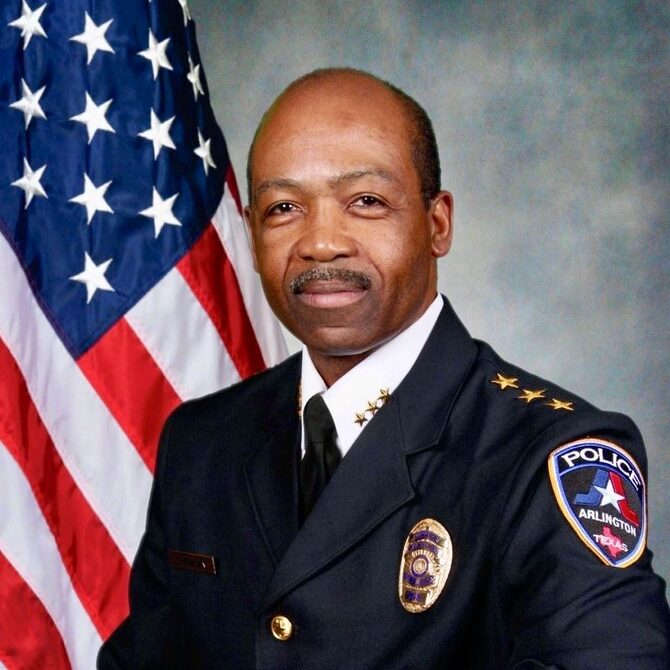Evidence-Based Policing Hall of Fame
Theron Bowman
Inducted June 2012
Nominated by Hubert Williams, Police Foundation
Biography:
Dr. Theron L. Bowman is Chief of Police in the Arlington Police Department. Dr. Bowman began his law enforcement career with the Arlington Police Department in 1983, working his way up the ranks, becoming Chief in 1999. Since 1990, he has served on the faculty at three local universities, teaching Sociology, Criminology, and Criminal Justice classes.
He attended the University of Texas at Arlington where he obtained a Bachelor’s Degree in Biology, a Master’s Degree in Public Administration, and a Ph.D. in Urban and Public Administration. Dr. Bowman is also a graduate of the Senior Management Institute for Police, the FBI National Academy, and the FBI National Executive Institute.
Chief Bowman has been recognized by the African American Peace Officer Association of Arlington as the “Officer of the Year” and has received a Proclamation of Achievement from both the Texas State Senate and the U.S. House of Representatives. The John Ben Shepperd Public Leadership Institute presented him with the Outstanding Local Leader Award, and the Police Executive Research Forum presented him with the Gary P. Hayes Award.
He was elected to chair the Texas Intelligence Council in 2005 and began his service as a CALEA Commissioner in 2006. He is a member of the International Association of Chiefs of Police, National Organization of Black Law Enforcement Executives, The Police Executive Research Forum (PERF), and a host of other organizations.
Evidence-Based Research and Practice:
Chief Bowman is specifically recognized for his efforts in facilitating the Police Foundation’s rigorous experimental field study of the effects of compressed work weeks in policing, and more generally for his track record of evidence-based policing in Arlington, Texas.
The shift experiment required significant cooperation from him and his officers and was foundational in exploring one of the most important issue in police organizations today. Few experimental studies in policing have required random assignment of officers to conditions that could have as significant an impact on their lives as that of the hours and days that they work. The shift length experiment was one of the most complex and difficult field studies to run because it required officers to participate in simulations at all times of day and night (and at the end of their shifts), and considerable resources (such as office space, personnel, etc.).
Outcomes of interest examined in this study included officer performance, safety, health, quality of life, fatigue, sleep, and extra-duty employment, to discover the potential advantages and disadvantages associated with various shift schedules (8, 10, and 12 hour shifts). The agencies agreed to maintain the conditions (shift length, time of day, and district) throughout the course of the six-month period of the study.
As Hubert Williams, President of the Police Foundation wrote in recommendation of Chief Bowman, “The Police Foundation Study would not have been possible without Chief Bowman’s commitment to advancing the field of policing through agency participation in research. His commitment to evidence-based practices in policing is further demonstrated by the number and caliber of other research projects performed in the APD under his leadership. Without police leaders like Chief Bowman, much of what we know about what works–and what does not–in policing would not have been possible.”
Publications and Projects Reflecting Inductee's Efforts:
- Amendola, K. L., Weisburd, D., Hamilton, E. H., Jones, G., & Slipka, M. (2011). The shift length experiment: What we know about 8-, 10-, and 12-hour shifts in policing. Washington, DC: Police Foundation. (Available here)
- Bowman, T. L. (2006). The chief’s perspective: Demolishing the recruitment myth. The Police Chief, August, 22023.
- Bowman, T. L. (2003/205). Policing partnerships: Creating communities, building leaders. Texas Police Chief, Winter, 19-22.
- Bowman, T. L. (2002). Educate to elevate- academics ‘have pushed our department to a new level of professionalism and innovation.’ Texas Police Journal, November, 15-17.
- Data Driven Approaches to Crime and Traffic Safety (DDACTS) evaluation (NTSA, ongoing)
- How police officers and police agencies work (National Police Research Platform, 2010)
- Patrol deployment through various algorithms using Arlington Police Department data (Southern Methodist University, 2011)
- Risk terrain modeling- used for robbery reduction efforts, not hoping to evaluate model on a larger scale (Rutgers University, 2010-2011)
Links:
- Arlington Police Department
- Message from Chief Bowman, Arlington Police Department
- Interview with Chief Bowman on Innovation in Community Prosecution
- Chief Bowman’s Lecture on “Diversity, Education, and Professionalism: Arlington’s Path to Excellence in Policing”
- Bowman’s Consulting Website
- Police Foundation Shift Length Experiment
- Karen Amendola Discusses the Police Foundation Shift Length Experiment
- National Poilce Research Platform Agency Profiles

